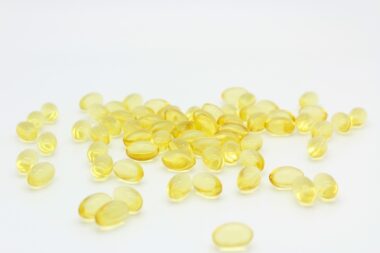Omega-3 Fatty Acids and Their Effect on Cardiovascular Health in Sport
Omega-3 fatty acids are essential nutrients vital for optimal health. Athletes and fitness enthusiasts have begun to recognize their potential benefits in enhancing cardiovascular health. These beneficial fats primarily come from fish oil and are classified into three main types: EPA, DHA, and ALA. EPA (eicosapentaenoic acid) and DHA (docosahexaenoic acid) are primarily sourced from marine fats, while ALA (alpha-linolenic acid) is derived from plant sources like flaxseeds and walnuts. Research indicates that omega-3 fatty acids can significantly contribute to heart health by improving lipid profiles and lowering triglyceride levels. An improved lipid profile is crucial for athletes, as it can enhance endurance and overall performance. Moreover, they can reduce inflammation in the body, promoting faster recovery after intense workouts. Including omega-3-rich supplements, like fish oil, in an athlete’s diet can help maintain heart health during strenuous activity. Regular consumption is linked to lower blood pressure, which is beneficial during intense physical exertion. Hence, athletes may gain various competitive advantages from proper omega-3 incorporation into their daily regimes. Focus on quality supplementation is crucial for maximum efficacy.
Understanding the Mechanisms of Omega-3 in Cardiovascular Health
The mechanisms through which omega-3 fatty acids support cardiovascular health are multifaceted and vital for athletes. They help mitigate oxidative stress in the body, which can accumulate from exercise-induced activities. This oxidative stress can lead to cellular damage and cardiovascular issues if left unchecked. Omega-3 fatty acids counteract this by increasing the production of beneficial nitric oxide, which promotes vasodilation. This effect enables better blood flow and oxygen delivery to working muscles during intense activity. Clinical studies have demonstrated that omega-3s may also help regulate heart rhythm, reducing the risk of arrhythmias. These healthy fats contribute to the stabilization of heart tissues, giving them a protective role against irregular heartbeats. In addition, omega-3 fatty acids have been shown to lower levels of C-reactive protein (CRP) in the blood, a marker of inflammation. Athletes require optimal recovery strategies, and reducing inflammation aids in muscle repair and minimizes downtime after training. Thus, incorporating omega-3 fatty acids into a sports diet supports both immediate performance and long-term cardiovascular health.
Various food sources and supplements are available to athletes for obtaining omega-3 fatty acids. Fatty fish, such as salmon, mackerel, and sardines, are among the richest sources of the essential EPA and DHA. Beyond fatty fish, flaxseeds, chia seeds, and walnuts offer ALA, which can convert to EPA and DHA in limited amounts. While these food options are beneficial, many athletes prefer supplements for convenience. Fish oil capsules and liquid oils are widely available and provide a concentrated dose of omega-3s. It’s prudent to choose high-quality, purified fish oil supplements to minimize potential contaminants like heavy metals. Additionally, athletes need to be mindful of their omega-3 to omega-6 fatty acid ratios, as Western diets tend to be excessively high in omega-6s. This imbalance can contribute to inflammation, negating the anti-inflammatory benefits of omega-3s. Therefore, monitoring dietary intake is pivotal for optimal health. Not only are omega-3s essential for heart health, they also impact overall well-being, including brain function and joint health, making them a critical addition to any athlete’s nutritional plan.
Practical Guidelines for Incorporating Omega-3s
To effectively incorporate omega-3 fatty acids into their diets, athletes must consider their specific training regimens and health goals. A general recommendation is to aim for at least two servings of fatty fish per week, which provides a sufficient amount of EPA and DHA. For those who find it challenging to consume enough omega-3-rich foods, supplementation can be a practical solution. Consulting with a healthcare provider or a registered dietitian can help determine the appropriate type and dosage of supplementation. Standard fish oil supplements often recommend a dosage between 1,000 to 3,000 mg of combined EPA and DHA daily. However, these dosages can vary based on individual health needs. Athletes engaged in heavy training may benefit from the higher end of the dosage range. It’s also essential to be cautious about using omega-3s alongside blood-thinning medications, and regular monitoring of blood lipid levels is advisable. Implementing omega-3 supplementation gradually can also help manage any potential gastrointestinal discomfort. By balancing active lifestyles with proper nutrition, athletes can harness the power of omega-3 fatty acids effectively.
The relationship between omega-3 fatty acids and improved recovery times is a noteworthy point for athletes. Strenuous physical activities often cause micro-tears in muscle fibers, leading to delayed onset muscle soreness (DOMS). Omega-3s play a protective role by reducing muscle inflammation and soreness after intense exercise sessions. They can help lower muscle enzyme markers like creatine kinase (CK), which indicate muscle damage. Additional advantages include potentially enhancing joint health, which is vital for athletes performing repetitive movements in their sports. Omega-3 fatty acids can also increase the thickness of cartilage, providing better shock absorption and improved joint function. This aspect is crucial for long-term athletic performance and injury prevention. Including omega-3 sources in the recovery phase can help to reduce pain and promote muscle repair. Furthermore, the anti-inflammatory properties of omega-3s contribute to an overall faster return to peak performance levels. Given the busy training schedules of athletes, prioritizing post-workout nutrition that includes omega-3s can lead to significant improvements in performance and recovery.
Omega-3 Fatty Acids and Mental Health
The impact of omega-3 fatty acids extends beyond physical health; it includes significant benefits for mental health as well. Several studies have shown that adequate omega-3 intake can help alleviate symptoms of anxiety and depression, which are not uncommon among competitive athletes. The competitive nature of sports can lead to increased levels of stress, and omega-3 fatty acids can help regulate neurotransmitter levels in the brain, aiding overall mental stability. Proper brain function is critical for athletes, as mental acuity directly impacts decision-making and reaction times during competitions. The health of neuronal cell membranes benefits from omega-3 consumption, potentially influencing mood and cognitive function positively. Moreover, the reduction of inflammation in the body may enhance overall mental clarity, reducing the mental fatigue that can accompany rigorous training regimens. Ensuring a balanced intake of omega-3s can foster resilience in athletes, allowing them to cope better with the pressures of their sports. By prioritizing both mental and physical health, athletes position themselves for optimal performance and longevity in their athletic careers.
As the evidence regarding omega-3 fatty acids and their effects on cardiovascular health continues to accumulate, it’s clear that their role cannot be understated. Athletes seeking to optimize their performance should consider the extensive benefits these essential fats provide. From improved heart health to enhanced recovery times, the advantages of omega-3s are manifold. Furthermore, their impact on mental health adds another layer of appeal for athletes facing the pressures of competition. Both short-term and long-term considerations should be factored in to harness the full potential of omega-3 fatty acids. Regular incorporation of omega-3 sources into dietary regimes may also yield preventative benefits against cardiovascular diseases over time. Ensuring proper doses through diet or supplements is essential for effectiveness. Finally, community awareness about the importance of these essential fats can promote overall well-being, especially among active populations. Athletes can leverage this understanding to enhance not just their performance but their overall health. Achieving peak performance while maintaining heart health promotes longevity in their sport and ensures a fulfilling athletic journey.





